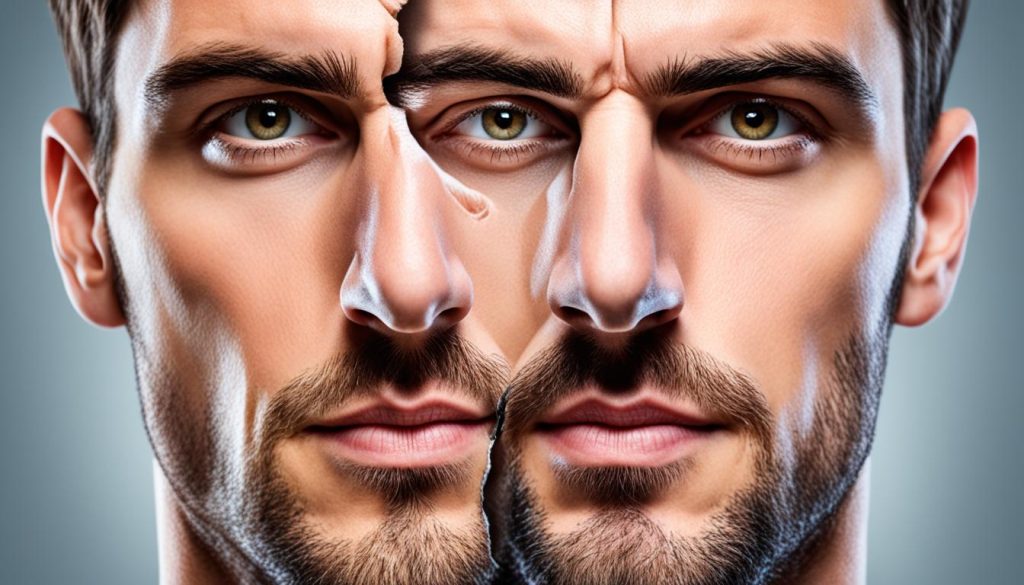Ad Blocker Detected
Our website is made possible by displaying online advertisements to our visitors. Please consider supporting us by disabling your ad blocker.
Testosterone is often associated with sexual performance and the quality of erections. Many people wonder if testosterone can actually make them harder. Let’s explore the connection between testosterone and erectile function to determine if there is any truth to this claim.
- Testosterone plays a role in sexual function and can contribute to the quality of erections.
- The effects of testosterone on sexual performance vary from person to person.
- Consult with healthcare professionals to understand the individual impact of testosterone on sexual function.
- Other factors, such as overall health and lifestyle, also influence sexual performance.
- Using testosterone for better erections should be done under medical supervision.
The Myths Surrounding Testosterone and Anger
One common myth is that taking testosterone can cause anger or violent behavior. However, research has shown that there is no strong correlation between testosterone and aggression.
While hormonal changes can affect mood, it is important to understand that testosterone won’t change who you are or make you more prone to anger or violence. Masculinity and aggression are complex traits influenced by various factors, including socialization and personal experiences.
Studies have actually suggested that testosterone may play a role in promoting emotional stability rather than irritability. It has been found to enhance positive mood, reduce anxiety, and improve overall emotional well-being.
It is crucial to dispel the misconception that testosterone is solely responsible for aggression. Existing research indicates that other factors such as genetics, environment, and individual temperament contribute significantly to behavioral outcomes.
“Testosterone is often unfairly stigmatized as fueling aggressive behavior, but it is important to recognize that this is a gross oversimplification. We must move beyond stereotypes and embrace a more nuanced understanding of masculinity and its relationship with aggression.”
Individuals should be cautious not to attribute anger or violent behavior solely to testosterone levels. It is essential to consider multiple factors and consult with healthcare professionals to address any concerns about emotional stability, mood, or irritability.
The Complex Relationship Between Hormones and Mood
Understanding the effects of testosterone on mood requires acknowledging the complex interplay between hormones and emotional well-being.
While testosterone can influence mood, it does not act in isolation. Other hormones, such as cortisol and oxytocin, also play significant roles in regulating emotions and social interactions.
It is important to remember that emotions are multifaceted, and testosterone’s impact on mood varies among individuals. Some people may experience increased emotional stability and improved well-being, while others may notice minimal changes.
Furthermore, each person’s unique biology, genetics, and psychological makeup contribute to their emotional responses. It is crucial to recognize that everyone’s journey with testosterone is personal and unique.
Seeking Professional Guidance
If you have concerns regarding the effects of testosterone on mood, it is advisable to consult with a healthcare professional who specializes in hormone therapy. They can provide personalized guidance and help you navigate any emotional changes that may occur during hormone treatment.
Remember, your emotional well-being is significant, and healthcare professionals are there to support you throughout your hormone journey.
| Common Myths | Facts |
|---|---|
| Testosterone causes aggressive behavior | Research shows no strong correlation between testosterone and aggression |
| Testosterone leads to irritability | Testosterone can enhance emotional stability and well-being |
| Testosterone makes you more prone to anger or violence | Behavioral outcomes are influenced by various factors, including genetics and personal experiences |
The Impact of Testosterone on Emotional Expression
Another misconception is that taking testosterone will prevent you from crying. While some individuals may find it more difficult to cry after starting testosterone, others may experience no change or even find it easier to access their emotions. How testosterone affects emotional expression can vary from person to person.
Contrary to popular belief, testosterone does not completely eliminate the ability to cry. While it can have an impact on emotional processing, the extent to which it affects an individual’s ability to shed tears is not definitive.
Testosterone, a hormone primarily associated with masculine traits, plays a complex role in emotional range. Research suggests that this hormone influences various aspects of emotional processing, including the intensity of emotional responses, the interpretation of emotional cues, and the regulation of emotions.
While testosterone can affect the expression of emotions, it is important to note that emotional range is a multifaceted aspect of human experience influenced by various factors. Factors such as upbringing, personal experiences, and individual differences all contribute to emotional expression. Testosterone is just one piece of the puzzle.
“Men aren’t afraid to cry. It’s societies that teach them they mustn’t.”
– Jane Fonda
It is worth considering how societal expectations and norms shape our understanding of emotional expression. Stereotypes and stigmas surrounding masculinity and emotions can perpetuate misconceptions about the impact of testosterone on crying and emotional range.
While some individuals may find it more challenging to cry while on testosterone, others might experience no change or even find it easier to tap into their emotions. It is essential to recognize and respect the diverse ways in which individuals experience and express their emotions.

Exploring Emotional Processing on Testosterone
Several studies have investigated the effects of testosterone on emotional processing. While research is ongoing in this area, preliminary findings suggest that testosterone can influence emotional response patterns, empathy, and the recognition of emotional expressions.
For example, a study conducted by Bos et al. (2010) found that higher levels of testosterone in men were associated with reduced empathic accuracy, meaning that individuals with higher testosterone levels may have difficulty accurately identifying and understanding the emotions of others.
However, it is crucial to note that these findings do not apply universally to all individuals. Testosterone affects each person differently, and the relationship between testosterone and emotional processing is complex and multifaceted.
Importance of Emotional Well-being
Emotional well-being encompasses a wide range of experiences and expressions. It is essential to prioritize emotional health and create a safe space for individuals to explore and express their emotions authentically.
While testosterone can have an impact on emotional expression, it is vital to recognize that emotions are a valid and vital part of the human experience. Suppressing or invalidating emotions based on societal expectations can be detrimental to one’s emotional well-being.
Individuals undergoing hormone replacement therapy involving testosterone should work closely with healthcare professionals to monitor their emotional well-being and address any concerns or questions they may have. Open communication with medical providers can ensure personalized care and support throughout the hormone transition process.
Testosterone and Menstruation
Testosterone can have an impact on the menstrual cycle in transgender individuals. While it often halts the process of menstruation, it is important to note that some individuals may experience spotting or continue to menstruate, especially on lower doses of testosterone. It is crucial to understand that testosterone hormone replacement therapy (HRT) does not guarantee the permanent cessation of ovulation or menstruation. Additional measures may be necessary to manage bleeding.
Changes in the menstrual cycle can vary from person to person, and it’s always essential to consult with healthcare professionals for personalized guidance. They can provide insights into the potential effects of testosterone on fertility, bleeding patterns, and the management of ovulation-related concerns.
Testosterone and Fertility
When considering testosterone and fertility, it’s important to understand that testosterone HRT can have an impact on fertility in transgender individuals. Testosterone therapy typically suppresses ovulation and reduces the chances of pregnancy. However, it’s crucial to consult with healthcare professionals and discuss contraception options if pregnancy is not desired.
It’s recommended to consult with fertility specialists or reproductive endocrinologists before starting testosterone therapy if preserving fertility is a priority. They can provide guidance on fertility preservation options, such as egg or sperm freezing, to ensure future reproductive possibilities.
While testosterone HRT can have transformative effects, it’s important to navigate its potential impact on menstruation, fertility, and overall well-being with the guidance and expertise of healthcare professionals.
Testosterone and Menstruation: A Comparative Overview
| Effect | Testosterone and Menstruation | Testosterone and Fertility |
|---|---|---|
| Impact | Halts menstruation in many individuals, but some may experience spotting or continue to menstruate, especially on lower doses. | Reduces fertility and suppresses ovulation in transgender individuals. Consultation with healthcare professionals is crucial when considering pregnancy or fertility preservation. |
| Considerations | Additional measures may be necessary to manage bleeding. | Consultation with fertility specialists or reproductive endocrinologists is recommended for fertility preservation options. |

Image: Testosterone can have an impact on the menstrual cycle in transgender individuals.
Debunking the Myth of Testosterone and Attractiveness
Many people fear that taking testosterone will make them unattractive or affect their ability to find partners. However, transitioning can often enhance one’s attractiveness as individuals embrace their true authentic selves. Beauty standards are subjective, and transgender and non-binary individuals can be just as desirable as anyone else.
“Transitioning allowed me to express my true self and embrace my identity fully. I’ve found that as I’ve become more confident and comfortable in my own skin, others have found me more attractive as well.”
– Mia, transgender woman
The idea that testosterone automatically leads to greater attractiveness is rooted in societal beauty standards that prioritize specific characteristics. However, attractiveness is not solely determined by hormone levels or physical appearance. It encompasses diverse qualities such as personality, confidence, and individuality.
Transgender and non-binary individuals have their own unique beauty that defies traditional norms. Their journeys of self-discovery and self-acceptance often result in a genuine radiance that captures attention and admiration.
It is essential to challenge and break free from narrow definitions of attractiveness. Embracing diversity and expanding our understanding of beauty creates a more inclusive society where everyone can be valued and appreciated for who they are.

Embrace Your Authenticity and Rediscover Your Attractiveness
Transitioning is a deeply personal and transformative experience. It allows individuals to align their outward appearance with their true selves, leading to increased self-confidence and a stronger sense of identity.
When you embrace your authenticity, you radiate a unique appeal that goes beyond traditional standards of attractiveness. Your journey and the courage it takes to live authentically can be incredibly attractive qualities that draw others to you.
Remember, beauty is not limited to one specific mold – it comes in various forms, colors, and expressions. By embracing your own uniqueness and defying societal expectations, you can inspire others and redefine what it means to be attractive.
Conclusion
When it comes to sexual performance, testosterone does play a role in enhancing the quality of erections. However, it’s important to separate the truth about testosterone from the myths that surround it. While testosterone can have some impact on emotional expression, menstruation, and attractiveness, it’s crucial to understand that these effects vary from person to person.
Consulting with healthcare professionals is essential in order to fully comprehend the individual impact of testosterone on sexual performance. They can provide personalized guidance and help debunk any misconceptions or myths surrounding testosterone. Taking the time to gather accurate information and understanding the truth about testosterone is key to making informed decisions about your sexual health.
So, if you’re considering testosterone as a means to enhance your sexual performance, rest assured that it can contribute to the quality of your erections. However, remember that testosterone is not a magic solution and its effects go beyond just sexual function. By seeking professional advice, you can separate fact from fiction and navigate the complexities of testosterone’s impact on your overall wellbeing.
FAQ
Does testosterone make you harder?
Testosterone plays a role in sexual function and can contribute to the quality of erections. However, the effects of testosterone on hardness vary from person to person.
What are the effects of testosterone on hardness?
Testosterone can improve erectile function in individuals with low testosterone levels. It can enhance the quality of erections by increasing blood flow to the genitalia.
How does testosterone affect sexual function?
Testosterone is important for maintaining sexual desire and performance. It influences libido, arousal, and the quality of erections.
Can testosterone improve sexual performance?
Testosterone therapy can help individuals with low testosterone levels improve their sexual performance. However, it may not have the same effect on individuals with normal testosterone levels.
Does testosterone affect erection quality?
Testosterone levels can impact the quality of erections. Low testosterone levels can lead to difficulties in achieving and maintaining firm erections, while adequate testosterone levels can promote better erectile function.
Is testosterone for better erections?
Testosterone therapy can help improve erectile function in individuals with low testosterone levels. However, it is important to consult with a healthcare professional to determine if testosterone therapy is appropriate for you.
Is there a correlation between testosterone and anger?
No, there is no strong correlation between testosterone and aggression. While hormonal changes can affect mood, testosterone won’t change who you are or make you more prone to anger or violence.
Does testosterone prevent crying?
Testosterone may impact emotional expression differently from person to person. While some individuals may find it more difficult to cry after starting testosterone, others may experience no change or even find it easier to access their emotions.
How does testosterone affect emotional expression?
Testosterone can affect emotional expression in different ways. Some individuals may experience changes in emotional range or find it easier to control their emotions, while others may not notice any significant changes.
What is the impact of testosterone on the menstrual cycle?
Testosterone can affect the menstrual cycle in transgender individuals. While it often halts the process of menstruation, some individuals may experience spotting or continue to menstruate, especially on lower doses. Additional measures may be necessary to manage bleeding.
Does testosterone affect attractiveness?
Transitioning and embracing one’s true authentic self can often enhance attractiveness. Beauty standards are subjective, and transgender and non-binary individuals can be just as desirable as anyone else.
Should I consult a healthcare professional about the effects of testosterone on sexual performance?
Yes, it is crucial to consult with healthcare professionals to understand the individual impact of testosterone on sexual performance. They can provide personalized guidance and monitor your hormone levels to ensure optimal results.
Does Testosterone Alone Provide the Same Results as Viagra for Erectile Dysfunction?
While testosterone helps some men with erectile dysfunction, it doesn’t yield the same results as Viagra. Both have their own advantages, but studies haven’t shown testosterone’s superiority over Viagra in treating ED. It’s essential to consult a physician to determine the best course of treatment.


